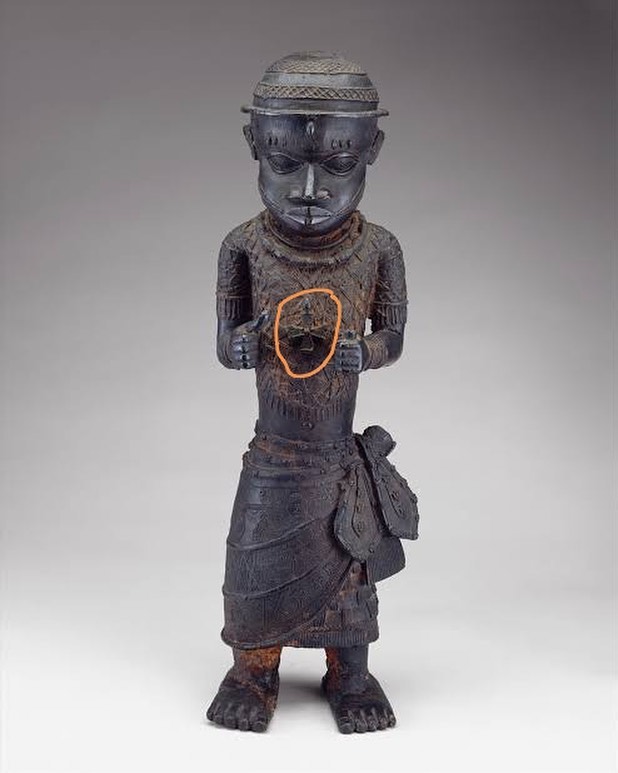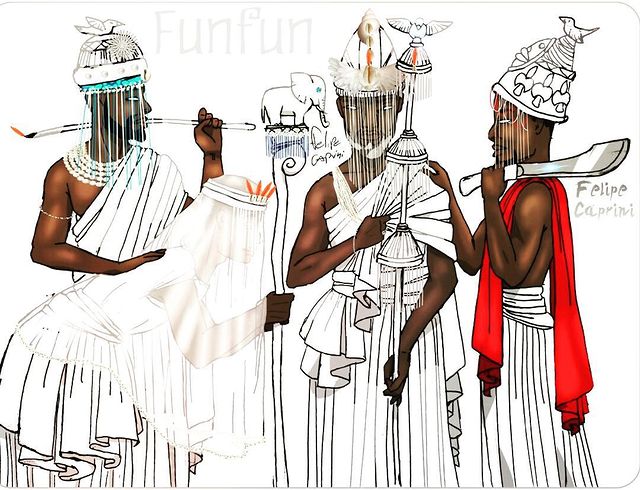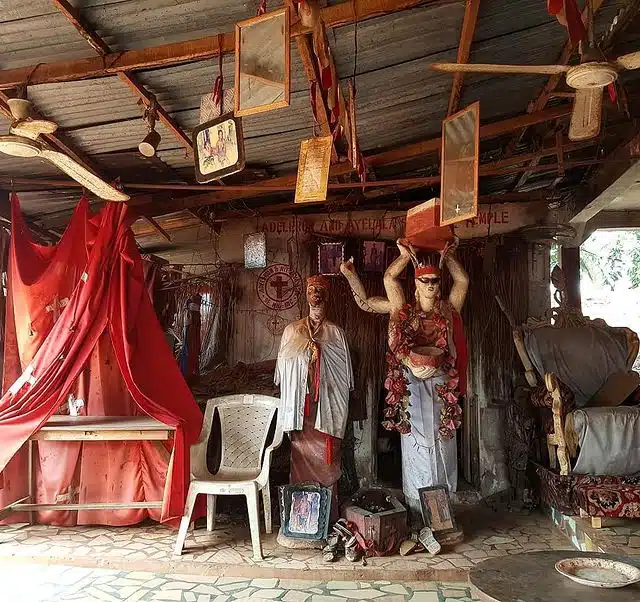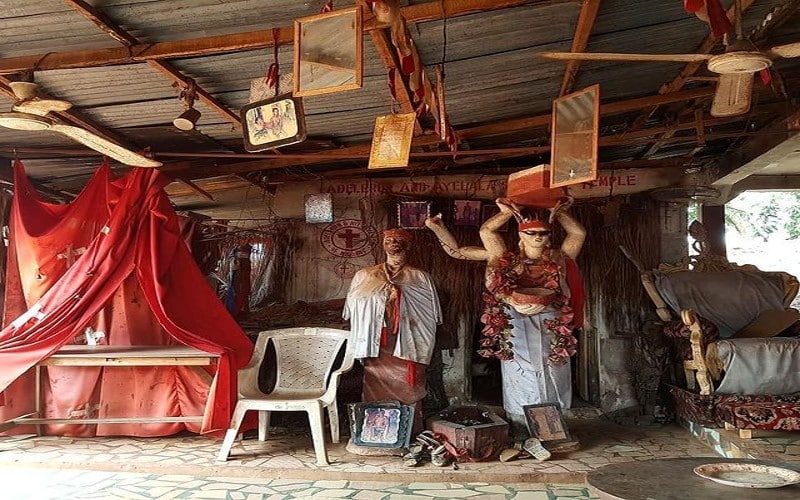In Yoruba land, many deities are known as orishas. These orishas include Osun, Oya, Yemoja, Ayelala, Aja, Oba, and many others. Among these deities, Orisha Ayelala has maintained a feared position within the Yoruba tribe of Nigeria for centuries.
She is the Orisha of justice and vengeance. She is a powerful and sacred deity. Yoruba people respect her for her role in punishing crimes and ensuring justice is served. Prepare to go on a mind blowing journey into the deep roots of Yoruba mythology, where ancient tales mix with the present day.
Stay tuned as we go deeper into the mysteries of Ayelala, we will explore the rituals and ceremonies dedicated to her, the stories our elders passed through generations, and the enduring devotion of her followers. We will seek to understand the legends that surround her, and her powers.
Etymology of Ayelala
Pronouncing Ayelala
I will try to break this down as simply as I can, shall we?
A-YE-LA-LA
To pronounce it:
- “A” sounds like “Ah” (as in the exclamation).
- “Ye” sounds like “Yay” (expressing excitement).
- The first “La” sounds like “La” (as in the musical note).
- second “La” also sounds like “La” (as in the musical note).
Putting it together, you get: Ah-Yay-La-La.
That is to say, Ah-Yay-La-La (Ayelala)
Meaning of Ayelala
‘Aye’ means The World.
‘Lala’ means Large or incomprehensible.
So Ayelala means the world is a mystery or the world is incomprehensible.
Origin of Ayelala
Ayelala is a goddess whose origin is traced to ilaje, Ondo State. This is her story.
A commoner engaged in sex with an Ilaje nobleman’s wife, a criminal offense. When people found out, he fled, seeking refuge among the Ijaw people (another tribe in Nigeria), who granted him asylum. The Ilaje demanded his return and his death. Now an issue of pride, the Ijaw people refused. This dispute threatened to escalate into warfare and negotiations were held.
The Ilaje and Ijaw people formulated a shared moral code, condemning witchcraft, war, and theft. However, the Ilaje would not compromise regarding the escaped commoner, either he had to return to face the death penalty or a substitute had to die for him, and so an enslaved woman was produced to serve as ransom.
Before the people executed her, they expected her to pray and follow ritual procedures, but this woman, described as devoutly religious, could not. All she could say was “Ayélála,” which means “the world is incomprehensible,” a cry of protest against the injustice of her fate.
Afterward, they started worshiping her and called her Ayélála. (Her real name is a ritual secret).
Myths related to Ayelala
The Oba market incident in 2005

The rise of Ayelala in Edo State can be traced to an incident of 2005, when thieves razed Oba Market in Ring Road, Benin City.
Many shops were burned and looted. But many shops that they didn’t touch were also looted by thieves. This provoked the anger of the Bini people.
After several failed attempts by the Police to get any of the looters, the Chief Priest of Ayelala was invited and on arrival gave a 24-hour ultimatum to the unidentified looters to return the stolen goods or face the wrath of Ayelala.
As a result of the fear of the deity’s swift justice, the thieves returned all the goods they stole to the various shops from where they stole them.
Ayelala Junction in Ilaje, Ondo State.
After her death, people uncovered the truth of the incident to the people and they felt bad by what they did, they later made serious efforts to appease the said lady by naming a junction after her “orita Ayelala” (Ayelala Junction) in Ilaje Local Government of Ondo state.
They later turned her to a goddess and worshiped to continue the pacification after many events.
(Notably, the Ilajes are a distinct migratory coastal linguistic group of Yoruba peoples spread along the coastal belts of Ondo, Ogun, Lagos and Delta states).
Characteristics of Ayelala
Ayelala, the powerful deity in Nigerian mythology, possesses several distinct characteristics and roles within the cultural and spiritual framework.
Punishment
Firstly, she is the deity of justice, enforcing moral codes and ensuring that wrongdoers face the consequences of their actions. She has the power to punish those who act unjustly or against the well-being of the community. She serves as a symbol of righteousness and holds individuals accountable for their deeds.
Revenge
Secondly, as a deity associated with justice, people call upon her for revenge. She has the power to seek revenge on behalf of the wronged, balancing the scales of justice and ensuring that there is fairness. Her ability to deliver vengeance serves as a weapon against injustice and wrongdoing.
Confessions
Thirdly, witches caught up in her clutches confess their sins in the open. People invoke her to unravel the cause of the diabolical cause of mysteries, like the reason behind a sudden death. She also infests thieves & trespassers in its domain with mumps, a disease that causes terrible swelling of all body parts. The offender would not get any relief until he confesses and brings back all items stolen.
Oath
Furthermore, she is often used to swear for oath taking, over the years, I witnessed a lot of scenes, where couples in relationships will swear an oath with this goddess never to leave each other which they mostly respect and keep as everyone fears her wrath, also they use her to swear an oath when anything is missing and so on.
Exclamation
Finally, so you might have come across people, just screaming Ayelala!, It’s totally normal over here and no they are not calling upon the orisha, people just use it as sort of an exclamation over here, don’t get it twisted, lol!
Fun fact: An average Ikale man screams Ayelala about four times daily.
Symbols related to Ayelala
Flag: Her flag is red, they place it in a farm land or plantation to forestall loss of farm products to thieves, and whoever trespasses faces her anger.
Ayelala water: one of the signs of when this orisha is inflicting someone is a swollen stomach (filled with Ayelala water).
Kola Nuts (Obi): It requires a divination system for a priest to work with this orisa. It is also important to note that its Kola nuts divination practice is totally different.
In addition, Duck/cock are animals related to this goddess.
Taboos, Praises and Worship of Ayelala
Week (Taboos)

They are social or cultural restrictions that dictate certain behaviors, actions, or subjects that people consider forbidden, impure, or unacceptable within a particular society or community.
1. The Priests and Ayelala Victim: According to the tradition, the priest of Ayelala should not take anything that belongs to the Ayelala victim. Instead, they should pack these items and the priest will take them to Igbo oro (the sacred forest).
2. Mourning and Burial: Another taboo within the tradition of this goddess is that they should not mourn or bury the victim in the house.
3. Use of Palm Kernel: use of palm kernel as a means of worshiping Ayelala is considered a taboo.
Praises (oriki) of Ayelala
Igbo, Igbo, Igbo,
Yeye, Yeye, Yeye,
Ore yeye, ore yeye, ore yeye,
Kawo o kabiyesile;
okekeluje oba obinrin,
A-ji-fotin we b-oyinbo,
A-ji-nijo-oloran-gbagbe,
A-ja-ma-jebiIgbo o…Ase.
Translation
Praise, Praise, Praise
Mother, Mother, Mother
The very mother, the very mother, the very mother Hail! Chief of the mother
The mighty and awesome Queen
She, who baths in gin like the foreign men,who take vengeance when the evil-doer has been forgotten,who can never be guilty when she takes action,
Praise o …
May it be so.
Worship mode

The worship of this orisha takes place regularly at the shrine, mostly in the morning. It simply involves the use of wine, accompanied by incantations and prayers. If someone is in need of this goddess assistance, the priest will arrange a worship session on their behalf.
Infact, during this session, the person seeking help will bring a white plate containing kolanut (Obi) and a bottle of palm wine (Ogogoro). They will also present a sacrificial animal, which can be a goat or a hen, along with cowries, a red feather, and two yards of white garment.
In the presence of the priest (Olumale), the person involved will offer these items to the orisha as a means of seeking a solution to their problem. The priest will stand before the goddess, holding everything that the person brought, He will intercede on behalf of the person, appealing to her for assistance and guidance.
Orisha Ayelala across tribes
The spread of this goddess to other tribes beyond its traditional areas like Ilaje, and Ikale (Yoruba tribe) regions is a notable phenomenon.
This expansion is obvious in regions like Benin and other parts of Edo State, showcasing how her influence extends towards the east.
The deity’s rise in these new territories reflects a cultural diffusion of religious practices and beliefs, highlighting the adaptability and acceptance of this beyond its original boundaries.
Unlike some deities that may undergo modifications when adopted by new communities, This worship remains steadfast in its traditional form, infact, they are more scared of it than the original owners, which shows the deity’s role in upholding moral boundaries and seeking justice against various forms of social vices.
Orisha Ayelala across borders
Orisha Ayelala, a deity in the Yoruba religious system, has crossed borders and can be found in various parts of the world.
Notably, the Yoruba people and their culture are almost everywhere,which leads to the spread of the culture, with significant communities in the United Kingdom, Canada, the United States, Brazil and Latin America
Togo:
Firstly, Ayelala has deep roots in Togo, particularly among the Ewe people. In Togolese culture, They consider her a powerful and protective deity.
Brazil:
Furthermore, people also venerated this orisha in Afro-Brazilian religions, particularly in Candomblé.
Due to the transatlantic slave trade, people brought african traditions and deities, including Ayelala to Brazil by enslaved Africans.
North America.
Finally, the diaspora brought Ayelala worship to various parts of North America, particularly in communities with African diasporic traditions.
In regions such as the United States and the Caribbean, practitioners of African diasporic religions, such as Santeria, Vodou, and Candomblé, continue to honor this orisha alongside other Orishas.
Furthermore, It is important to note that the specific practices, rituals, and beliefs surrounding Ayelala may differ in each of these regions, as per changes by local cultural contexts and spiritual traditions.
Nonetheless, this orisha presence across borders highlights the enduring significance and adaptability of this goddess beyond its original cultural and geographical origins.
Final Thoughts
In conclusion, Ayelala is a Sacred deity in Yoruba mythology, people know her for her role in justice and vengeance. Her devotees worship her through rituals and ceremonies, and her followers seek her guidance and protection.
Infact, her influence is beyond Yoruba land, reaching other tribes and even crossing borders, showcasing the adaptability and acceptance of her power and significance in addressing societal issues.
Featured Image Credit: sudabeh.mortezai on Instagram

